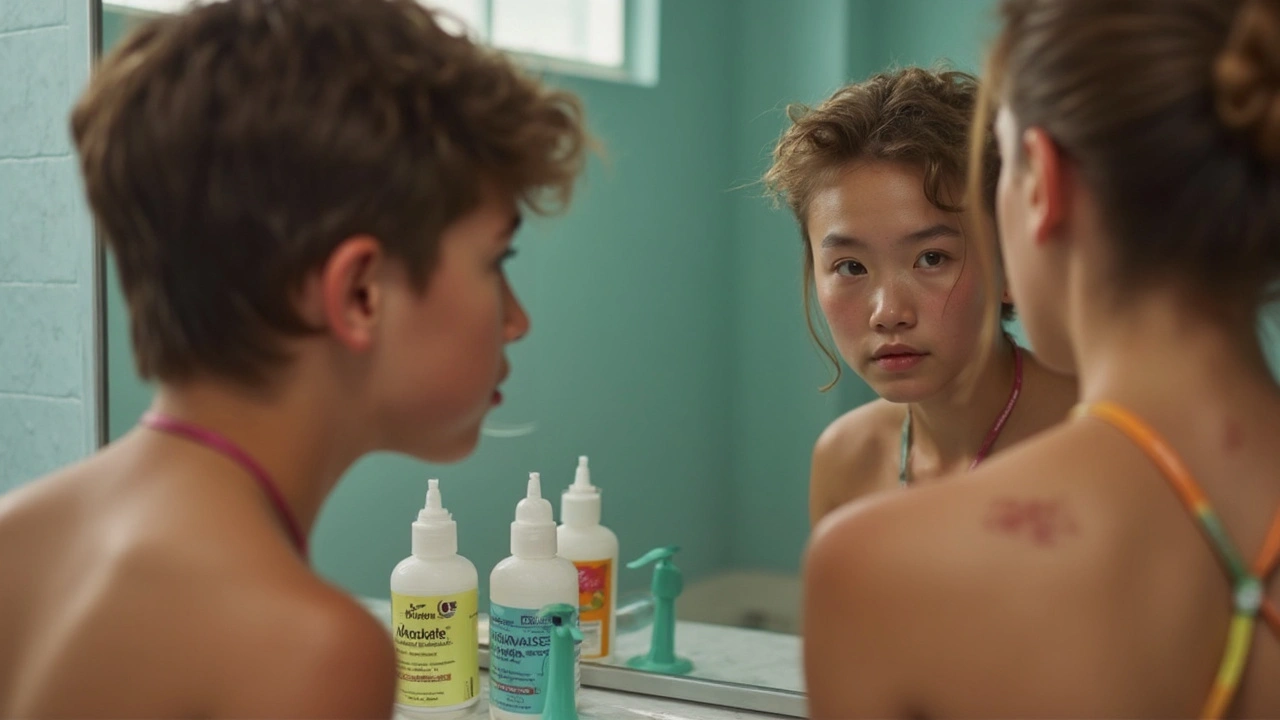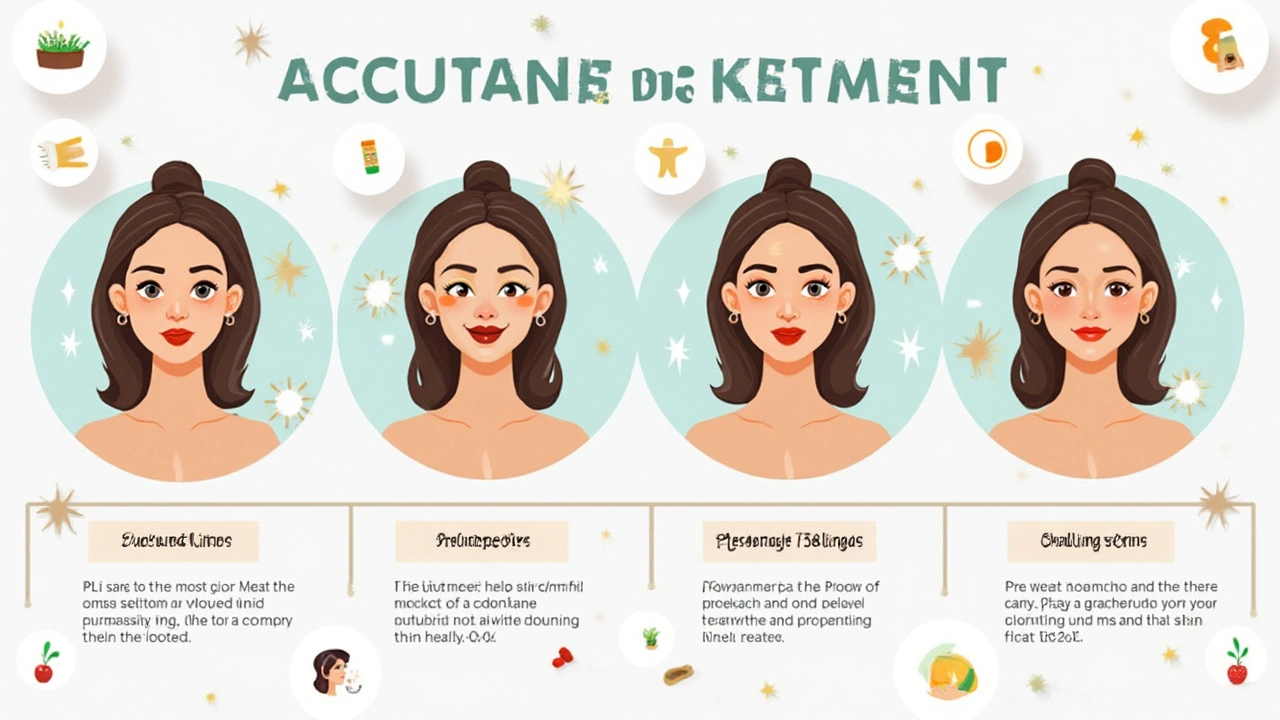Sunscreen in February? Yup, you’ll need it—because Accutane changes everything about how your skin deals with the sun and just about everything else. If you’ve ever battled volcanic pimples or cystic acne that seems immune to every “miracle” serum on TikTok, you’ve probably heard whispers (or, let’s be real, loud warnings) about Accutane. It’s the drug dermatologists reach for when nothing else works, but is it worth the hype—and the side effects? Thousands of people in 2025 are still asking that exact question, just like they did 10 and even 30 years ago. Let’s get candid about what actually happens on Accutane, why it works when nothing else does, and what you should brace yourself for—because real talk beats rumor any day.
What is Accutane, and How Does It Work?
Accutane isn’t a magic pill, but for a lot of people, it’s as close as it gets. The generic name is isotretinoin, and it’s been around since the ’80s when people realized standard acne washes and creams weren’t cutting it for everyone. Most acne drugs attack bacteria or try to calm inflammation, but isotretinoin flips the script: it shuts down your oil glands, so the stuff that keeps clogging pores dries up—almost completely. The change is dramatic, and not just on your face. People have noticed when they’re on it, their skin feels drier and tighter, lips are suddenly desert-level chapped, and that greasy T-zone can turn into a land of flakes.
Doctors don’t hand out Accutane like candy. It’s reserved for severe nodular or cystic acne that resists everything else. The standard dose is about 0.5 to 1 mg per kilogram of body weight. The treatment usually lasts 4 to 6 months, and by the end, your sebaceous (oil) glands produce way less oil, sometimes up to 80% less. For teens and adults whose lives revolve around fighting mood-killing breakouts, that’s life-changing. But the list of potential side effects is epic, and every doctor follows strict guidelines because of one massive risk: birth defects. If you’re pregnant—or planning to be—you just can’t take this drug. Period.
One of the most interesting facts: out of all the treatments out there, Accutane is the only one that often “cures” acne permanently. In a well-known study published in the Journal of the American Academy of Dermatology, about 85% of patients stayed clear for years after a single course. Still, about 15% might need a second round, and a lucky few get flawless skin for life. The secret? Isotretinoin shrinks, and sometimes permanently alters, the oil glands. So, anyone still dealing with relentless breakouts after antibiotics, retinoids, or endless topicals, might want to ask their derm about this option.
| Aspect | Detail |
|---|---|
| Generic name | Isotretinoin |
| Developed | 1982 |
| Main purpose | Severe cystic/nodular acne |
| Oral dosing | 0.5–1 mg/kg/day |
| Duration | 4–6 months |
| Long-term clear rate | 85% |
| Main side effects | Dry skin, dry lips, joint pain |
| Major warning | Birth defects/pregnancy risk |
Isotretinoin’s magic isn’t just about shutting off oil. It’s also anti-inflammatory, and may even fade old acne scars for some. But that power comes with a price: your skin will become pretty sensitive, which means breaking out the SPF 50 rain or shine. Forget peeling oranges bare-handed—hello, painful cuticles. You’ll also be asked to go in for monthly blood tests, partly to check your liver and cholesterol, since the drug can mess with both. Talk about commitment!

Real Side Effects, Real Preparation: Before and During Accutane
Before doctors hand over a prescription, you’ll be quizzed about everything: your skin history, birth control plan (if it matters), and any mental health struggles. The warnings are serious for good reason. Isotretinoin’s list of common side effects is long, but most people say the worst is lip and skin dryness. Aquaphor and thick face creams pretty much become your new best friends. Drink water like you’re lost in the desert—seriously, that’s a tip people who’ve been there all swear by. Getting a humidifier for your bedroom helps too, especially in winter. Don’t even get me started on nosebleeds and crackly hands. They’re more common than you think, but manageable if you plan ahead.
Another thing to know: nosebleeds and dry nasal passages are frequent, so dabbing a tiny bit of Vaseline just inside your nostrils can stop things before they get bloody (literally). Eyes can dry out too, especially if you wear contacts. Artificial tears help. A lot of people get mild joint or back pain, and some find their workouts feel tougher. Dial it down if you need to. The key is to listen to your body, not push through just to keep up “normal” routines.
There’s a lot of debate about mood changes and depression. Some studies report no connection; others, like one from 2023, claim a small but real increase in mood swings during treatment. The consensus? If your mood tanks, let your doctor know right away. Don’t try to tough it out alone. The more honest with your healthcare team you are, the easier it’ll be to spot if something’s off. And don’t forget: every single month, women of childbearing potential must have a negative pregnancy test to refill their script. This part isn’t negotiable.
- Moisturize multiple times daily—don’t wait until things get bad.
- Invest in fragrance-free, gentle cleansers. Harsh stuff will burn or sting.
- No waxing—seriously, you’ll lose skin. Threading or plucking only.
- Don’t skip sun protection. Think hat + sunscreen, even if it’s cloudy.
- Keep chapstick everywhere—bag, desk, car. You’ll thank yourself.
The way Accutane is prescribed is tightly regulated, especially in places like the US, UK, and Australia. Programs like iPLEDGE require you to sign waivers and do monthly check-ins. Some people find this annoying; others say it makes them feel safer. It’s all about minimizing risk, not only for the patient but for any future pregnancies and mental health concerns. And most folks get a blood draw every month—nobody loves it, but it keeps you safer. In rare cases, doctors might cut the dose or pause treatment if blood lipids climb too high or if there are liver function changes. Most of the time, though, people finish their course without big medical drama, just with drier lips and big hope things will clear for good.
Here’s a pro tip: take your dose with a fatty meal. Isotretinoin is fat-soluble, meaning it gets absorbed better if you have it with, say, an avocado toast or eggs. Some people who skip this see less improvement, so don’t ignore it. Another popular hack is to stash lotions and balms in every room, every bag, every pocket. Why? Because dry moments come out of nowhere, and forgetting moisturizer is, frankly, rookie error.
Some effects go beyond skin: nose, mouth, even the inside of your ears can get crazy dry and itchy. For lips, slugging (layering heavy ointment at night) helps most. And if your skin suddenly feels like sandpaper? Switch to a heavier cream, and give your skin a break between washing and applying treatment. Razor burn and eczema can pop up; so can small rashes or redness from the most random things. Just be gentle and dial back anything that stings.
What about diet? There’s no magic food to skip, but because Accutane can raise cholesterol and other fats in your blood, eating less fried or high-fat junk is a smart idea. Omega-3 supplements can sometimes help if your doctor approves. Your liver does most of the heavy lifting here, so the less you can stress it, the better. That means lay off alcohol, too, since it can make side effects worse or even put your liver at risk. If you’re old enough to drink, remember: moderation, or best, zero during your course.

Life After Accutane: Results, Relapse, and Long-Term Tips
People often expect the Accutane “glow” to show up overnight. Reality check: skin usually gets worse before it gets better. There’s this weird thing called the “purge,” when deeper breakouts actually surface in the first month or so. It’s freaky, but many acne veterans say it was worth powering through. By month two or three, most people see a dramatic drop in new bumps, redness, and pain. For lots of users, by the end of the course, stubborn cysts basically vanish, scars fade a little, and blackheads are, pretty much, history.
Here’s the big question: does acne ever come back? For 85% of folks, it doesn’t—or if it does, it’s way less severe. But about 15% of people need a second or even third course, especially if started young. A study in 2022 pointed out that people under 16 when they started were a bit more likely to need a repeat. For most, though, that “Accutane-level” acne never returns. Some like to use a gentle retinoid post-treatment to keep things clear, but always check with your doctor before reintroducing anything harsh.
Long-term side effects? The big risks end when you stop the drug, since isotretinoin doesn’t hang around in your body for long. People do talk about lingering dryness, joint discomfort, and, rarely, mood changes sticking around, but science hasn’t supported any huge, permanent dangers for most. The key here is that each body’s response is unique. There’s no one-size-fits-all, but the majority report healthier self-esteem, clearer skin, and no regrets except wishing they’d tried it sooner (or moisturizing more religiously!).
- Keep up the SPF and gentle skincare. Your new skin is gorgeous, but still sensitive for a few months after treatment.
- Don’t rush into peels or microdermabrasion for at least 6-12 months, as your skin will need time to recover.
- If breakouts return, see your dermatologist sooner than later—a low-dose retinoid can sometimes keep things under control.
- Hydrate, hydrate, hydrate. Even after you finish, dry lips and skin might last a couple more months. Keep that chapstick close.
One often-overlooked conversation: scarring. While accutane helps with active breakouts, it won’t “fix” deep scars you had before starting. But it does allow your skin to heal without new ones forming, which is a relief for many. Some choose microneedling or lasers later (with doctor approval, of course) to work on leftover scars, but only once their skin has bounced back from months of dryness and fragility.
What about life hacks and pro tips from people who’ve done this? Having backup supplies—like extra moisturizers, scent-free wipes, and saline nose sprays—is a must, especially if you’re traveling. Some take pictures every week to track progress, which can help when the “purge” gets discouraging. Celebrating tiny improvements—like going a whole week without a new cyst—is surprisingly motivating. Many people also praise the emotional side of things: once the acne fades, hiding under makeup, hoods, or avoiding photos usually fades too.
The stigma around heavy-duty meds like isotretinoin is real. But so is the relief when treatment finally works after years of failed prescriptions. For a lot of people, Accutane isn’t an easy ride, but neither is living with the type of acne that keeps you up at night googling miracle cures. If you’re considering it or just curious, gather all the facts, keep your doctor in the loop, and prepare for dryness. The best advice? Don’t suffer in silence with either the symptoms or the side effects. Skincare isn’t just about how clear your face is—it’s about everything that lets you go out and actually live your life.

Irene Harty
June 14, 2025 AT 14:20It is evident that the widespread endorsement of isotretinoin is not merely a matter of clinical efficacy but also a carefully orchestrated campaign by conglomerates seeking to perpetuate a cycle of dependency. The pharmaceutical behemoths profit enormously from the marketability of a drug that necessitates continuous ancillary purchases-moisturizers, lip balms, and-most importantly-monthly monitoring. Moreover, the regulatory frameworks such as iPLEDGE appear less a safeguard than a mechanism to sustain patient compliance under the guise of safety. While the data on long‑term remission are impressive, one must remain skeptical of narratives that omit the subtle coercion embedded within prescribing practices. In sum, the discourse surrounding Accutane should be approached with a critical eye, lest we become unwitting participants in a profit‑driven paradigm.
Jason Lancer
June 14, 2025 AT 17:06I’m over it.
Brooks Gregoria
June 14, 2025 AT 21:16Everyone lauds Accutane as the ultimate salvation, yet they ignore the existential toll it exacts on the self. By stripping away sebum, the medication also erodes a primal barrier, leaving the epidermis exposed to the harsh arbiters of climate and time. Is not the pursuit of flawless skin a manifestation of our collective denial of imperfection? The very notion that a pill can "cure" a condition that is, at its core, an expression of hormonal flux is a philosophical fallacy. One must question whether the temporary aesthetic triumph justifies the potential erosion of intrinsic physiological harmony.
Sumit(Sirin) Vadaviya
June 14, 2025 AT 22:40Indeed, the concerns raised are not without merit, but let us also recognize the profound relief many experience when the disease subsides. From a clinical standpoint, the risk‑benefit analysis often tips in favor of treatment for severe nodular acne, provided stringent monitoring is observed. 😊 Keeping a vigilant eye on liver enzymes and lipid profiles is essential, and I commend those who adhere to these protocols with diligence. 📊 As always, open dialogue with healthcare professionals remains the cornerstone of safe utilization.
lindsey tran
June 15, 2025 AT 02:50OMG, let me tell you-this whole Accutane journey is like riding a rollercoaster in the middle of a thunderstorm, but the view at the top? totally worth it! First off, the skin dryness is brutal; I felt like a desert cactus, chapped lips screaming for mercy. But I kept the moisturizer stash on EVERY corner of my apartment-like literally, on my nightstand, in the kitchen, even in the bathroom, because you never know when a dry spell will strike.
Then there’s the “purge” phase-yeah, that nightmare where your face decides to throw a surprise party for all the hidden pimples. It’s scary, but hang in there; the breakouts thin out faster than you think, and the confidence boost after those crazy weeks is unmatched. I even started keeping a weekly photo log; watching the progress month by month felt like winning a personal award.
Don’t forget the SPF! Even on cloudy days, the sun is like that sneaky friend who shows up uninvited-slap on that SPF 50 and a hat, and you’ll thank yourself later. And yes, the lip balm is your new BFF; I’ve got it glued to my phone case now.
The best part? The mental lift when you finally look in the mirror and see clear skin-no more hiding behind layers of makeup or avoiding selfies. It’s like stepping out of a fog into bright daylight, ready to tackle whatever life throws at you. Keep your head up, stay hydrated, and remember: the struggle is real, but the glow at the end is legendary! 🌟